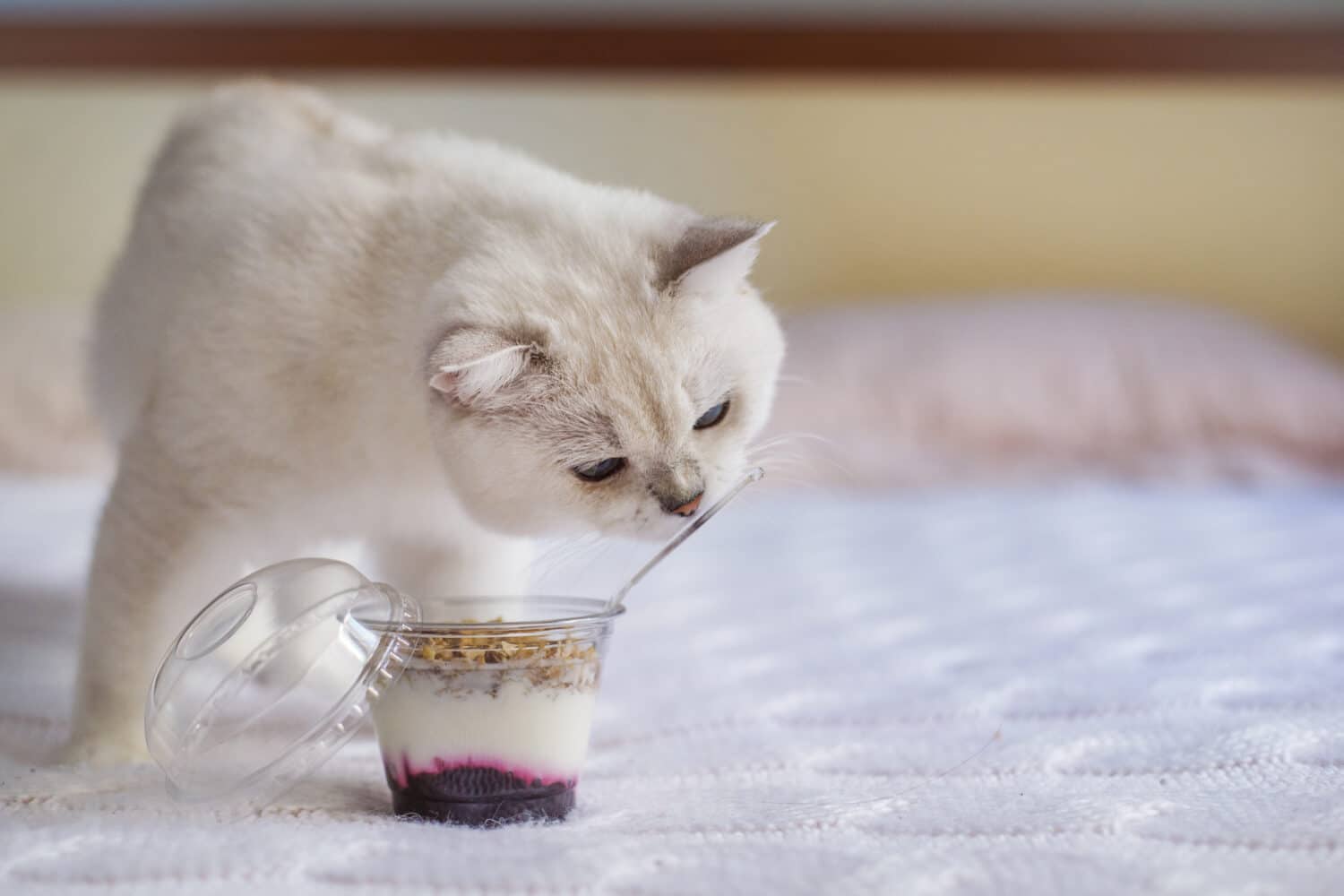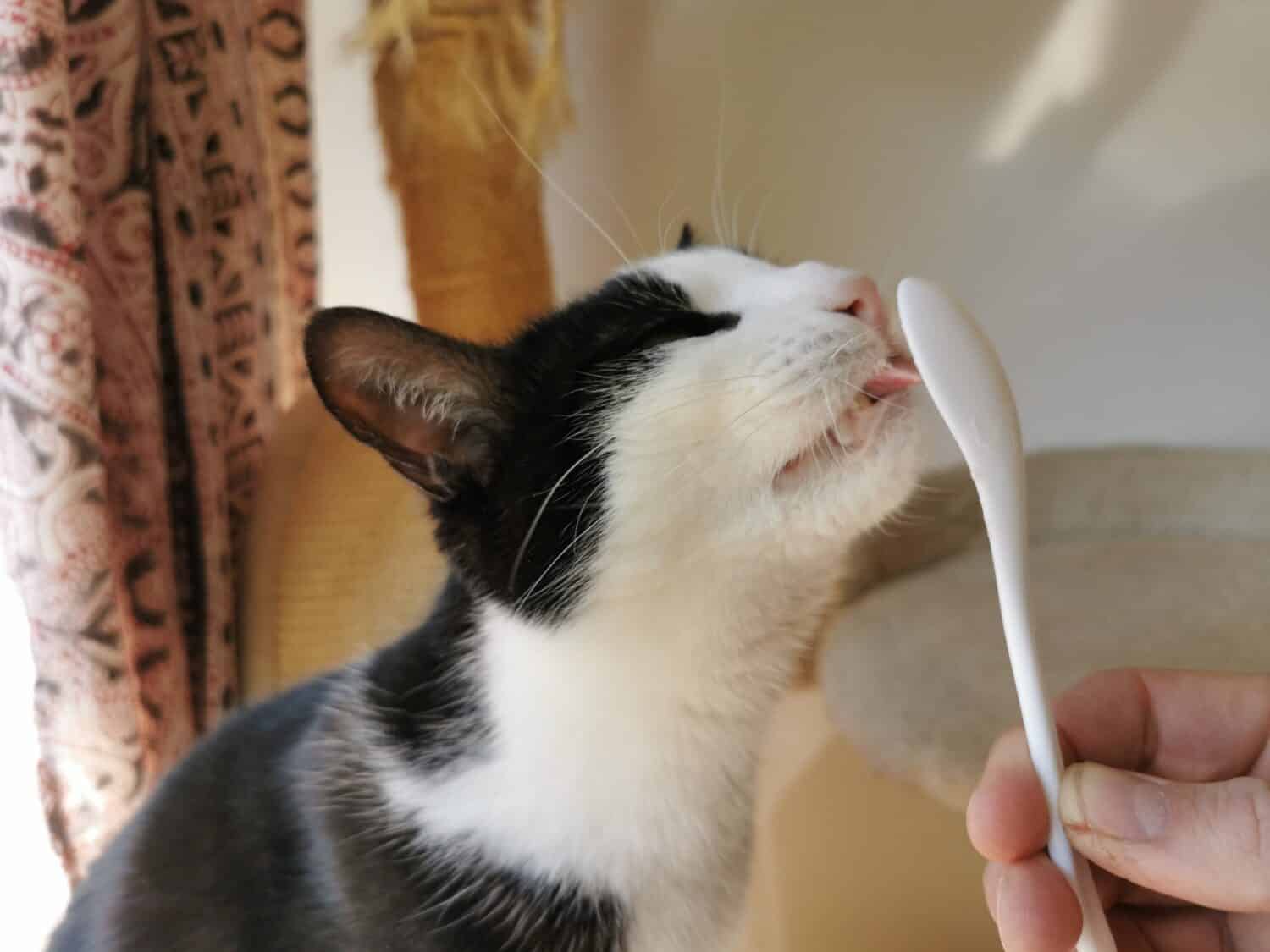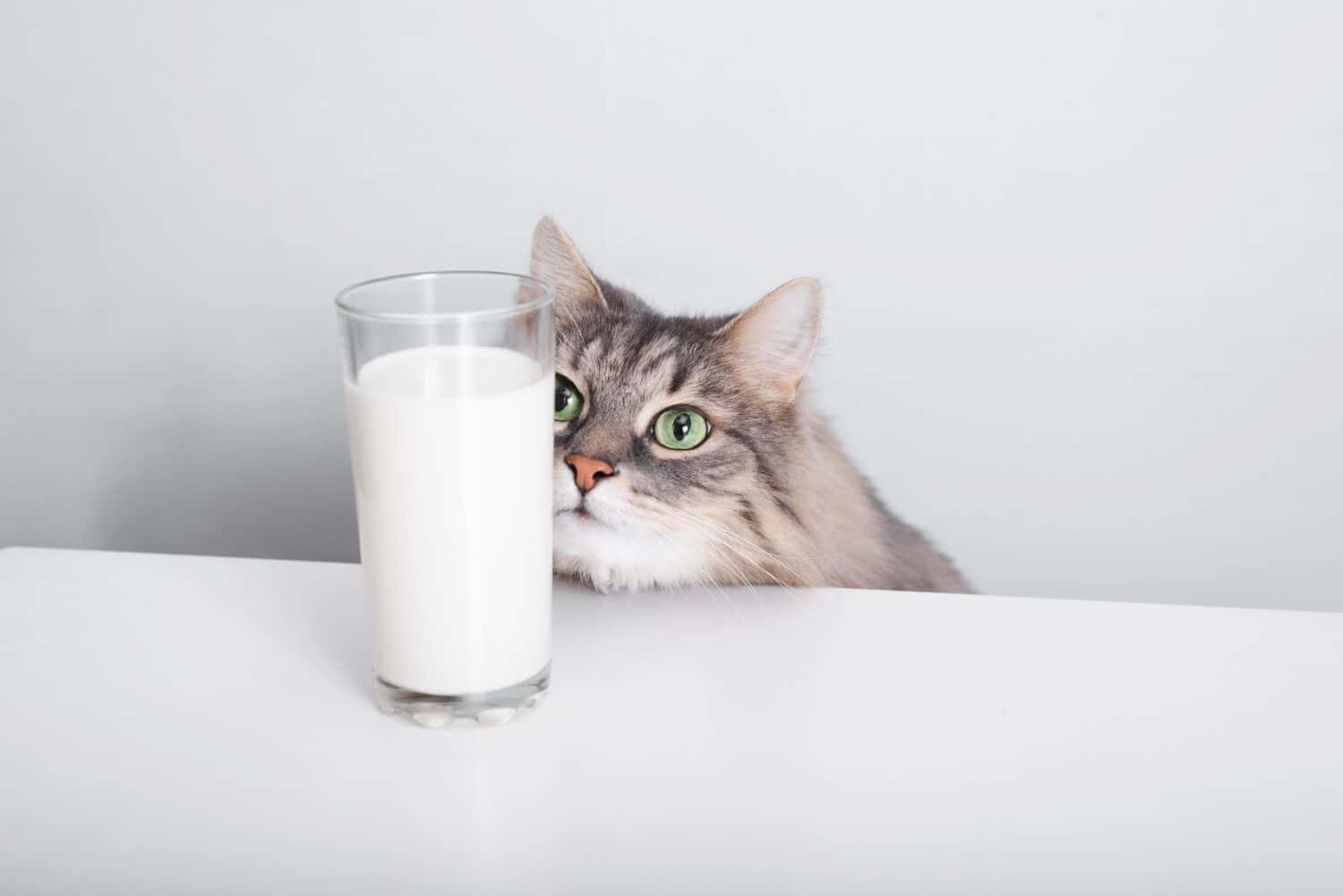Cats are lactose intolerant and don’t process dairy well, so yogurt isn’t especially healthy for them. However, it can be fed in small amounts as an occasional treat. Make sure it doesn’t contain toxic ingredients, and remember that plain, unsweetened yogurt is best.
If you have any questions about your cat’s diet, especially if they have ongoing health problems, please speak to your veterinarian.
In this article, we’ll discuss seven things you should know before feeding your cat yogurt.
7 Things to Know Before Feeding Yogurt to Your Cat

Yogurt isn’t good for cats because it contains lactose, which is difficult for them to digest.
©Tanya Afanasieva/Shutterstock.com
#1: Dairy Isn’t Good for Cats
Despite the common myth caused by cartoons, milk isn’t good for cats–and neither is yogurt. These products contain lactose, which can be difficult for cats to digest.
You may notice stomach upset, especially after your cat eats a large amount of yogurt. However, you’re unlikely to see long-term health problems unless they eat a lot of it or the yogurt contains toxic ingredients, like chocolate.
More often, their upset stomach will go away on its own. If symptoms are severe or persist for more than a couple of days, contact your veterinarian for help. Fatty foods like yogurt can cause pancreatitis, which is life-threatening.
#2: Some Yogurts are Toxic to Cats
Some yogurts contain ingredients that are toxic to cats. These include chocolate, grapes, and raisins.
You’ll also want to look for the sweetener xylitol, also known as birch sugar and wood sugar. While xylitol isn’t as toxic to cats as it is to dogs, it may still cause problems. Other sweeteners can also be dangerous for cats.
If you’re going to feed your cat yogurt, choose one with a few simple ingredients and research each to ensure it’s safe.
#3: Cats are Carnivores
Cats are obligate carnivores which means they were built to eat meat. Treats such as yogurt aren’t necessary, and they might not even enjoy them as much as a plain piece of chicken or turkey!
Simply put, there are healthier treats for your cat that are also more species-appropriate.
#4: Cats Cannot Taste Sweet Foods
Your cat may like yogurt, but they won’t taste it the same as humans do. If you want to give your cat a sweet treat, that’s not entirely possible.
This is because cats don’t have the tastebuds required to register sweetness as a flavor. This is thought to be because they evolved to eat primarily meat, while omnivores like humans and dogs do have the ability to detect sweetness.
#5: Small Amounts of Cat-Safe Yogurt are Unlikely to Hurt
With all of the above out of the way, giving your cat a lick of yogurt is unlikely to hurt them unless it contains toxic ingredients.
So, do your research first, but don’t be afraid to give a healthy cat a bit of your snack. Just don’t feed them too much, as it can cause stomach upset.
It’s always recommended that you start by giving very tiny amounts of a new food to see how your cat reacts before offering more.
It’s also important to know that treats should never make up more than 10% of your cat’s daily calories, so be sure not to overfeed them!
#6: Plain, Unsweetened Greek Yogurt is Best
Yogurt can contain a lot of sugars and fats that aren’t great for cats but make it more palatable to humans.
Even small amounts of sugar can mess with their blood sugar levels, especially if they have diabetes already.
Fatty foods can cause digestive upset or even pancreatitis, a life-threatening condition where the pancreas becomes inflamed.
When feeding yogurt in small amounts, these risks are small, but they don’t disappear entirely. To reduce risk, feed plain, unsweetened Greek yogurt. The fewer ingredients, the better!
#7: Yogurt Contains Nutrients but Isn’t Necessary for a Cat’s Health
Yogurt contains probiotics, vitamin B, protein, potassium, magnesium, and other key nutrients that cats need in their diet. However, yogurt is still non-essential and not particularly healthy for cats.
This is because your cat should be getting everything they need in their daily cat food. If they have a health problem and need nutrients such as vitamin B or probiotics supplemented, yogurt won’t be the best way of doing so.
Instead, your vet should prescribe supplements that will help. This ensures they’re getting the right amount of nutrients without unhealthy additives.
Pros and Cons of Yogurt for Cats
| Pros | Cons |
| Yogurt contains small amounts of probiotics that can benefit a cat’s digestive system. | Yogurt contains lactose, which most cats cannot digest properly. |
| Yogurt is high in protein, which is essential for cats. | The sugar and fat content in yogurt can make cats sick. |
| Yogurt contains B vitamins, potassium, and magnesium. | Some yogurts contain toxic ingredients. |
What Kind of Yogurt Can Cats Eat?

A small amount of yogurt is unlikely to hurt your cat.
©Johannes Ziegler Photo/Shutterstock.com
It’s best to feed your cat yogurt with as few ingredients as possible. Also, limit sugars and other sweeteners, as well as fat.
Plain, unsweetened Greek yogurt is the healthiest and least likely to cause health problems. However, you shouldn’t be tempted to buy yogurt just for your cat–they really shouldn’t be eating enough to warrant that!
How Much Yogurt Can I Give my Cat?
Cats should only eat very small amounts of yogurt. For example, you might let them lick the lid of a one-serving container or the back of your spoon once you’re finished eating.
Remember that cats are small animals with tiny stomachs. What feels like a little to us can actually be quite a big portion for them.
Too much yogurt can cause digestive upset, blood sugar spikes, and other health issues. So, it’s best to limit it!
Can Cats Have Milk?

Milk and other dairy products are also unhealthy for cats, especially in large amounts.
©Sergio Photone/Shutterstock.com
Unfortunately, it’s become a widespread myth that milk is good for cats. However, most cats are actually lactose-intolerant!
The lactose in milk can be even more difficult for them to process than yogurt since yogurt contains probiotics that help the process along.
Thank you for reading! If you have feedback on this post, please contact the AZ Animals editorial team.
The photo featured at the top of this post is © Tanya Afanasieva/Shutterstock.com
Thank you for reading! Have some feedback for us? Contact the AZ Animals editorial team.






